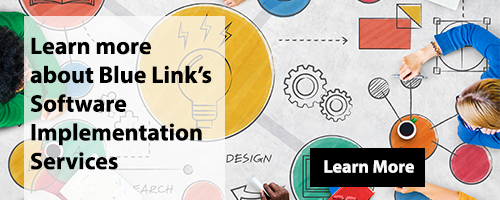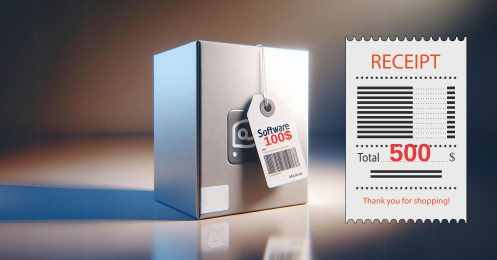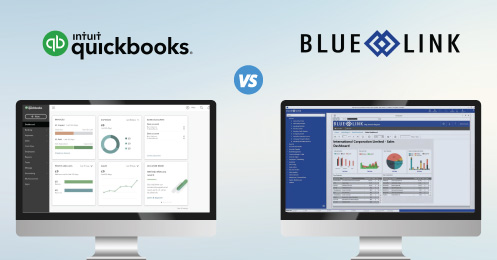Software training is one of the most important aspects of the accounting ERP implementation process and is also one of the most costly and resource-intensive. This is especially true for businesses that transition from introductory software such as QuickBooks, or manual processes, as there is a significant learning curve when it comes to using true ERP software. Unlike introductory systems, accounting ERP is designed to manage all aspects of a company’s operations from accounting, inventory management and order entry and processing to contact management and warehouse management. As an all-in-one solution, accounting ERP is designed to automate processes and increase efficiency. To best take advantage of the advanced functionality available, your team will be required to have a better understanding of accounting principles and good business practices.
The costs and resources required to properly train your team of employees will be worth the productivity gained from a successful implementation. When employees have received sufficient training and feel confident using software they will rely on it more to complete their tasks. This will result in less time wasted learning how to use the system every time a new task needs to be performed, and can help automate previously manual processes, reducing the instance of human error. With all the benefits to be gained from properly training employees, it is important to identify and plan for issues during this process. Every company is made up of employees with different personality traits, learning styles and attitudes, so it is important to develop the plan for training that will work best for everyone involved. Even when you have provisions in place to help make the training process as smooth as possible, you will still receive some negative push-back from employees. Below we have outlined certain personality types to watch out for during training in order to make the process as successful as possible.
Negative Nancy
We all know a Negative Nancy who always sees the glass half-empty, seems to complain about everything and is never content. This type of person can dramatically drag down company morale, stall projects and suck energy from a room. If you’re dealing with a Negative Nancy during an ERP training session it can add to the stress of an already high-pressure situation, ultimately hurting the outcome. However, Negative Nancy can also force you to remove any rose colored glasses and address issues head-on.
Although resistance from employees is a natural reaction to business change, when you have a Negative Nancy on your team the amount of resistance can become amplified. People with this mindset will not only strongly resist changing their processes, they will also complain about learning new technology and not make a conscious effort to learn the new system.
In order to avoid any issues when dealing with a Negative Nancy during training, it is important to first address all those involved with the accounting ERP project to review the plan for implementation. Make sure everyone on the team understands their responsibilities during the implementation and ensure that they have the resources in place to learn the new system while still keeping up with their regular responsibilities. Acknowledge the fact that there will be a significant learning curve involved with the new system, and come up with a plan that allows employees to voice their concerns in a constructive way. Create a process for employees to document any issues they experience, but only if they also recommend a suggestion for dealing with these issues. This ensures employees think of the solution and not just the problem, and will force them to think more critically about their comments.
Analytical Anne
Those we refer to as Analytical Anne are characterized by their attention to detail, analytical way of thinking and interest in technology. These people are great to have on your team but can sometimes get too caught up in the details, which can ultimately delay and hurt the software training process.
Analytical Anne has very good focus in order to complete tasks and never misses a detail. This type of person understands complex processes and systems and can help train other employees from your company. They have a very curious nature and will want to ask a lot of questions of the software vendor to make sure they fully understand the system. However, their interest in every minor detail can lead to schedule delays and general irritation from other teammates. Analytical Anne can get too caught up in the details and will want to know and understand every aspect of the software right away.
In order to keep implementation training on schedule, only involve Analytical Anne personality types when necessary, and make it clear that additional training can be provided at a later date as required. It is impossible to learn all the nuances to a new software solution in the short amount of time dedicated to initial training, and employees will only be able to take in so much information at once. Set a specific schedule for the initial training process with the most critical tasks, and ensure you stick to it – even if this means not allowing Analytical Anne employees to ask all of their questions. Most vendors will provide additional training resources in the form of video or written tutorials. Have Analytical Anne review these resources after initial training, making note of any questions as they arise, to be answered after Go-Live. Often these questions will be answered from reviewing the available material, or after employees have started to use the system on a regular basis.
Defensive Dave
Defensive Dave is the non-management employee who got assigned the task of managing the accounting ERP implementation project. They have been at the company for a long time and know the ins and outs of each department. They have a good relationship with everyone on the team, and will frequently volunteer to help with special projects. However, due to the magnitude of any ERP implementation, Defensive Dave will quickly become overwhelmed with the project assignment and the resulting defensive attitude can cause issues for the project as a whole. This issue is magnified if the management team and owners have taken a hands-off approach to the implementation and Defensive Dave does not have anyone to turn to for help. Because Defensive Daves do not want to look bad when the project starts to get off schedule, they will frequently place blame on the vendor and software system itself. This will increase resistance to change from other staff members and give the new system an unwarranted bad rap.
To avoid creating a Defensive Dave, form a team of people responsible for the entire implementation process and involve as many owners and members of management as possible. Have a team lead in place, but ensure the responsibilities of each team member are clearly outlined and accounted for. Stick to the original implementation plan set out and agreed upon by the team and vendor, so that employees and Defensive Dave do not become overwhelmed with new information and processes. Remember that additional training and consulting time can always be scheduled after Go-Live.











